-
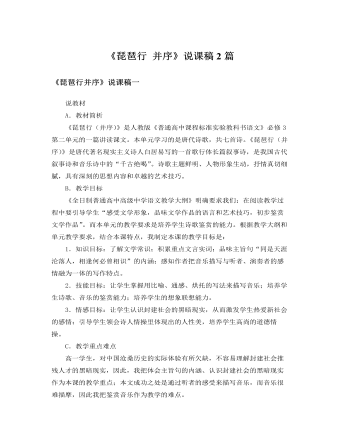
人教版高中语文必修3《琵琶行 并序》说课稿2篇
说教材A.教材简析《琵琶行(并序)》是人教版《普通高中课程标准实验教科书语文》必修3第二单元的一篇讲读课文。本单元学习的是唐代诗歌,共七首诗。《琵琶行(并序)》是唐代著名现实主义诗人白居易写的一首歌行体长篇叙事诗,是我国古代叙事诗和音乐诗中的“千古绝喝”。诗歌主题鲜明、人物形象生动,抒情真切细腻,具有深刻的思想内容和卓越的艺术技巧。B.教学目标《全日制普通高中高级中学语文教学大纲》明确要求我们:在阅读教学过程中要引导学生“感受文学形象,品味文学作品的语言和艺术技巧,初步鉴赏文学作品”。而本单元的教学要求是培养学生诗歌鉴赏的能力。根据教学大纲和单元教学要求,结合本课特点,我制定本课的教学目标是:1.知识目标:了解文学常识;积累重点文言实词;品味主旨句“同是天涯沦落人,相逢何必曾相识”的内涵;感知作者把音乐描写与听者、演奏者的感情融为一体的写作特点。
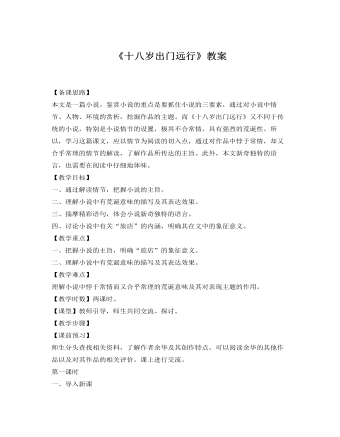
人教版高中语文《十八岁出门远行》教案
【备课思路】本文是一篇小说。鉴赏小说的重点是要抓住小说的三要素,通过对小说中情节、人物、环境的赏析,挖掘作品的主题。而《十八岁出门远行》又不同于传统的小说,特别是小说情节的设置,极其不合常情,具有强烈的荒诞性。所以,学习这篇课文,应以情节为阅读的切入点,通过对作品中悖于常情,却又合乎常理的情节的解读,了解作品所传达的主旨。此外,本文新奇独特的语言,也需要在阅读中仔细地体味。【教学目标】一、通过解读情节,把握小说的主旨。二、理解小说中有荒诞意味的描写及其表达效果。三、揣摩精彩语句,体会小说新奇独特的语言。四、讨论小说中有关“旅店”的内涵,明确其在文中的象征意义。【教学重点】一、把握小说的主旨,明确“旅店”的象征意义。二、理解小说中有荒诞意味的描写及其表达效果。
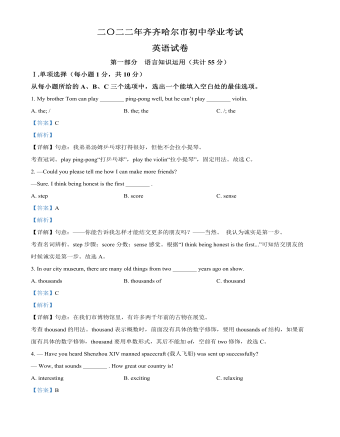
2022年黑龙江省齐齐哈尔市中考英语真题(解析版)
B: For 3 days. I expect togo there again.A: Lucky you. I had to stayat home. But I’m planning to travel to Mount Changbai.B: Oh, that’s a good place.I went there three years ago.
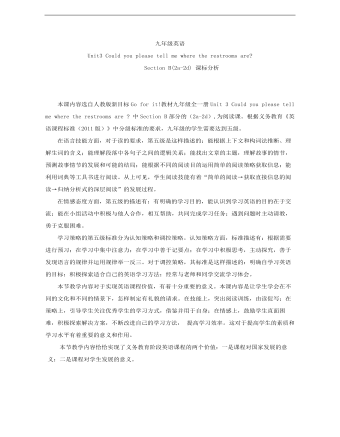
初中英语人教版九年级全册《Unit 3 Could you please tell me where the restrooms are》课标分析说课稿
学习策略的第五级标准分为认知策略和调控策略。认知策略方面,标准描述有:根据需要进行预习;在学习中集中注意力;在学习中善于记要点;在学习中积极思考,主动探究,善于发现语言的规律并运用规律举一反三。对于调控策略,其标准是这样描述的:明确自学习英语的目标;积极探索适合自己的英语学习方法;经常与老师和同学交流学习体会。
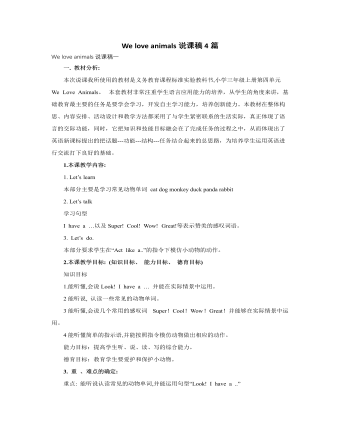
人教版新课标PEP小学英语三年级上册We love animals说课稿4篇
能力目标:培养学生听,做,说,读,写的能力,增进身体各部分的协调能力,语言表达能力。情感目标:让学生通过运用语言来完成学习任务,感受成功,从而引发和培养学生学习英语的内在动机,最终使他们形成英语学习的积极态度。同时培养学生要爱护动物。2. 教学重难点本课的教学重点是让学生能听、说、认读六个有关动物的词汇。教学难点是学生能将这六个有关动物的词汇运用到简单的英语句子中表达,突破重点和难点的关键是结合低年级学生喜欢游戏的特点,通过玩游戏,使单调的知识溶进生动的活动之中,让学生在听,做,动的过程中,掌握知识,并灵活地运用。三.说教法1.教法设计为了顺利完成以上教学目标,更好地突出重点,突破难点,按照学生的认识规律,我采用了讲读、直观演示、愉快教学相结合的方法,层层递进,激发学生的学习兴趣,充分调动他们学习的积极性,保持他们强烈的好奇心和旺盛的求知欲,进而促使他们由兴趣发展到产生要学好它的志趣。
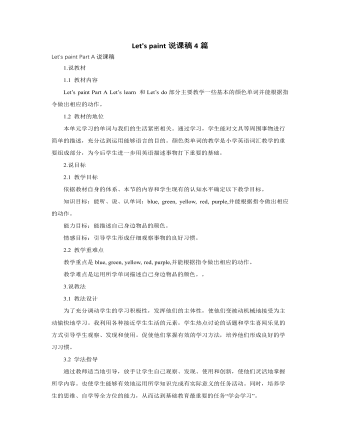
人教版新课标PEP小学英语三年级上册Let's paint说课稿4篇
本课教学从激发学生的兴趣入手,引导学生由词到句,循序渐进地达到学习目标,整个教学体现全员参与,体现合作探究,体现生活实践,在活动中开始,在情景中操练,在运用中创新,充分发挥学生的自主性,创造性。在整堂英语课堂教学中最大限度地激发学生的学习兴趣,使小学生在一节课的时间里始终保持高昂的学习状态。产生事半功倍的效果。 三、说教学手段 小学生的形象思维在其认识过程中占主导地位,三年级学生刚刚接触英语,学习一般靠直觉和体验,不善于把握语言规律,以直观的形象思维为主,对语言记忆以机械记忆占大多数,这就要求教师采用多样的教学手段,使课堂教学生动活泼,吸引学生,寓教于乐。1. 在小学英语课堂教学中要尽量多的采用实物情景进行直观的教学,这样做既符合小学生的认知规律,又能吸引他们的有意注意。
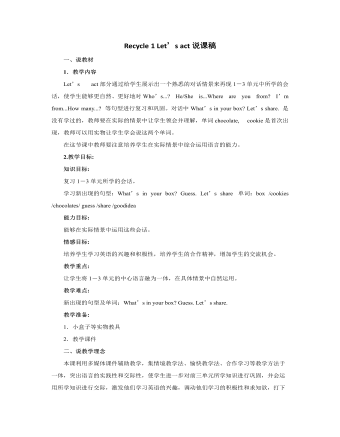
人教版新课标PEP小学英语三年级上册Recycle 1 Let’s act说课稿
小学生学习的主动性,大多取决于兴趣,他们充满好奇,对显而易见的实物和直观信息敏感性强、接受快。借助多媒体计算机CAI辅助教学,把所学内容更加直观地表现出来。4.游戏式复习热身,体现课堂教学开放性利用做游戏的形式进行旧知识的复习,既消除了上课初老师和学生之间的陌生感,又激发了学生学习兴趣,同时又对前面所学内容进行了巩固。5.综合运用“愉快教学”、“情境教学”、“合作学习”等多种教学方法,降低学习难度,活跃课堂气氛。6.展开活动式教学,设计各种形式为教学服务的活动,让学生在学中乐,在乐中学,不断强化知识的巩固记忆。7.设置评比台,及时评价小组及个人表现,鼓励学生积极参与学习活动。四、说教学流程1.拍手游戏热身2.师生问好,交流,对第一页内容复习3.引入第二页内容,学习新单词、句型4.趣味操练
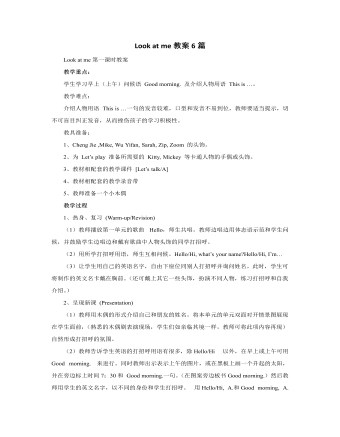
人教版新课标PEP小学英语三年级上册Look at me教案6篇
1.小组学习法全班分成各个部位,以半弧形状摆设,不仅拉近了师生、同学间的距离,便于口语交际和合作学习,而且让学生在独立与合作的交织中变得大胆、自信。2)Learning by singing, chanting, playing, touching.通过这些活动激发学生学习英语的兴趣,帮助他们建立学习的成就感和自信心。四.教学步骤英语课程的学习即是学生通过英语学习和实践活动逐步掌握语言知识,技能,提高实际运用能力的过程,又是他们陶冶情操,拓宽视野形成有效学习策略的过程。整个教学我设计了复习——新知展示——练习——小结及作业布置四个步骤。一.Warm-up1.Geetings2.SingasongT:Do you like to sing a song?Ss: Yes.T: Now, Let’s sing as ong,OK?Ss:OK. 【教师和学生一起边拍手边唱这首歌,不仅复习前面的打招呼语,而且把学生拉回到英语课堂,活跃了课堂的氛围,增加学生的学习兴趣】3.guessinggameT: Good. Look at me, What’s in my hand ?【教师拿出一个书包,书包内装入了各种学过的文具和一个玩具人头,让学生感到新奇,从而增强兴趣】

新人教版高中英语必修1Unit 2 Travelling Around-Listening and Speaking & Listening and Talking教案
【教学目标与核心素养】1. Instruct students to get main facts by listening and motivate them to talk about the topics about how to prepare for the trip and make reservations by listening and ultimately can make travel arrangements and reservations. 2. Develop students’ sense of cooperative learning and individual thinking capability. 3. Develop students’ different listening skills to solve different listening comprehensive problems.4. Help students to understand how to use the structures “the present continuous tense (be doing) is used to express future plans.【教学重难点】1. Teach students how to focus on key words, not on single words or grammar.2. Prompt Ss to talk about the related topics, such as how to prepare for the trip and make a travel plan.【教学过程】Step 1: Listening and SpeakingLead inThe teacher is advised to talk with their students about the places that they want to travel most both at home and abroad: boys and girls, if you have a chance to travel around the world, where will you go? After their small talk, the teacher can move on by finishing the following listening task:Before travelling, what do we need to prepare for the trip?

新人教版高中英语必修3Unit 1 Festivals and Celebrations-Reading and Thinking教学设计
The topic of this part is “Discover the reasons for festivals and celebrations.The Listening & Speaking & Talking part aims at talking about the experiences and feelings or emotions about the festivals and celebrations. This section aims at detecting the reason why the people celebrate the festivals, the time, the places, the types and the way of celebrations. It also explains why some traditions in the old celebrations are disappearing, like the firecrackers in the big cities and some new things are appearing like the prosperity of business or commerce. 1. Students can talk about what festivals they know and the reasons and the way of celebrating them.2. Students should learn the reading skills such as the headline and get the topic sentences, the structures of articles.3. Students can understand the past, the present situation of some festival around the world and why there are some changes about them. 4. Students can have the international awareness about the festivals.1. Students should learn the reading skills such as the headline and get the topic sentences, the structures of articles.2. Students can understand the past, the present situation of some festival around the world and why there are some changes about them.Step 1 Lead in---Small talkWhat festival do you like best ? Why ?I like the Spring Festivals because I can set off the fireworks, receive the lucky money and enjoy the Gala with my families.Step 2 Before reading---Pair workWhy do people celebrate different festivals ?The Spring Festivals is to celebrate the end of winter and the coming of spring and new life.The Mid-autumn Day is to celebrate the harvest and admire the moon.

新人教版高中英语必修3Unit 1 Festivals and Celebrations-Reading for writing教学设计二
Step 3 Analyzing article structureActivity 31. Teachers raise questions to guide students to analyze the chapter structure of this diary and think about how to describe the festival experience. (1)What should be included in the opening/body/closing paragraph(s)?(2)How did the writer arrange his/her ideas?(3)What kind of interesting details did the writer describe?(4)How did the writer describe his/her feelings/emotions during the event?2. Students read and compare the three sentence patterns in activity 2. Try to rewrite the first paragraph of the diary with these three sentence patterns. After that, students exchange corrections with their partners. Such as:●This was my first time spending three days experiencing the Naadam Festival in China’s Inner Mongolia Autonomous Region and it was an enjoyable and exciting experience. ●I'll never forget my experience at the Naadam Festival because it was my first time to watch the exciting Mongolian games of horse racing, wrestling, and archery so closely. ●I'll always remember my first experience at the Naadam Festival in China’s Inner Mongolia Autonomous Region because it was so amazing to spend three days witnessing a grand Mongolian ceremony. Step 4 Accumulation of statementsActivity 41. Ask the students to read the diary again. Look for sentences that express feelings and emotions, especially those with the -ing form and the past participle. Such as:● …horse racing, wrestling, and archery, which are all so exciting to watch. ● some amazing performances● I was surprised to see…● I was a little worried about. . . ● feeling really tiredOther emotional statements:●I absolutely enjoyed the archery, too, but the horse races were my favourite part. ●I'm finally back home now, feeling really tired, but celebrating Naadam with my friend was totally worth it. ●He invited me back for the winter to stay in a traditional Mongolian tent and cat hot pot. I can’t wait!2. In addition to the use of the -ing form and the past participle, the teacher should guide the students in the appreciation of these statements, ask them to memorize them, and encourage them to use them reasonably in writing practice.

新人教版高中英语必修3Unit 2 Morals and Virtues-Discovering Useful Structure教学设计
1. 表示时间。Hearing these stories, I’m skeptical about the place. = When I heard these stories. . . 2. 表示原因。Not knowing his address, I can’t send this book to him. = Because/Since/As I don’t know his address. . . 3. 表示结果。His father died, leaving him a lot of money. =. . . and left him a lot of money4. 表示条件。Going straight down the road, you will find the department store. = If you go straight down the road. . . 5. 表示让步。Being tired, they went on working. =Although they were tired. . . 6. 表示行为方式、伴随情况或补充说明。He lay on the grass, staring at the sky for a long time. =. . . and stared at the sky for a long time注意:非谓语动词作状语时, 如所提供的动词不能和句子中的主语保持一致, 动词-ing形式必须有自己的逻辑主语, 通常由名词或代词来担任, 这就是独立主格结构。The last bus having gone, we had to walk home. (having gone的逻辑主语是the last bus, 而不是we)Weather permitting, the football match will be played on Friday. (permitting的逻辑主语是time, 而不是the football match)Step 7 Practice1. ________(study) hard, you are sure to get first prize. 2. People use plastic in their daily life, _______(leave) large amounts of waste. 3. ________(work) hard at your lessons, you are to succeed. 4. The old man, ____________(work) abroad for twenty years, is on the way back to his motherland. 5. ______________(finish) his homework, he was playing on the playground. Answers: 1. Studying 2. leaving 3. Working 4.having worked 5. Having finishedStep 8 HomeworkFinish the homework on Page 22.

新人教版高中英语必修3Unit 2 Morals and Virtues-Reading for Writing教学设计
1. 这个寓言是一个关于一位国王古寓言。 The fable is an old fable about a king.2.作者用这个故事让读者对于社区的问题负有个人责任的必要印象深刻。The author used the story to impress upon readers with the need to take personal responsibility for problems in the community.3. 这个故事十分成功的实现了它的目的。The story was quite successful in achieving its purpose.Step 7 WritingPlease write a review of the story according the outline above.The fable is an old fable about a king who thought his people are lazy, so he put a large stone in the middle of the road and hides and waited to see if anyone will try to move it.The author used this story to impress upon readers with the need to take personal responsibility for problems in the community. The story was quite successful in achieving its purpose, and I liked it because it had a clear moral.However, while the moral of the story is clear, the actions of the king seemed pointless to me, because none of the characters in the story learnt anything. For this reason, I think there are better stories that can be used to impress upon people with the need for personal responsibility.Step 8 Pair workExchange drafts with a partner. Use this checklist to help your partner revise his/her draft.1. Does the writer give a short description of the story ?2. Does the description include the most important details of the story ?3. Does the writer give his or her opinion about the character or their actions ?4. Is the review well-organised ? 5. Does the writer use the -ing form as the adverbial correctly in the writing ?6. Are there any grammar, spelling, or punctuation errors ?Step 9 HomeworkPut up your revised draft in the classroom or read it to your class.

新人教版高中英语必修3Unit 4 Space Exploration-Listening&Speaking&Talking教学设计一
Listening and Speaking introduces the topic of “talking about how to become an astronaut”. This period is aimed to inform students some details about the requirements of being an astronaut. Students can be motivated and inspired by the astronauts. Teachers ought to encourage students to learn from them and let them aim high and dream big.Listening and Talking introduces the theme of "talk about life in space". This part also informs students more details about life in space and can inspire students to be curious about this job. 1. Guide students to listen for numbers concerning dates, years and ages etc2. Cultivate students' ability to talk about how to become an astronaut and life in space ; 3. Instruct students to use functional sentences of the dialogue such as “ first of all, I am not sure, so what might be .. I guess.. I wonder…I am curious…)appropriately.1. Guide students to understand the content of listening texts in terms of the whole and key details; 2. Cultivate students' ability to guess the meaning of words in listening; discuss with their peers how to become a qualified astronaut and describe the life in space.Part 1: Listening and SpeakingStep 1: Lead inPredictionThe teacher can ask students to predict what the listening text is about by looking at the pictures.About how to become an astronaut./the requirements of an astronautStep 2: Then, play the radio which is about an interview a. And after finishing listening for the first time, the students need to solve the following tasks.

新人教版高中英语必修3Unit 4 Space Exploration-Reading and Thinking教学设计二
The theme of this unit focuses on “space exploration.” Students will learn about the training and experience needed to become an astronaut. The text is mainly about the development of space exploration. On the one hand, the text helps students to have a good understanding about the great feats humans have achieved, on the other hand, they will further understand the contributions that we Chinese have achieved, and feel confident and proud about our homeland and strengthen their love for our country. The teacher should instruct students to aim high and study harder to make great progress in the space career if possible.1. Read about the development and value of space exploration.2. Explore the mysteries of the universe and the achievements in space exploration.3. Skillfully use the vocabulary of this text to cultivate self-study ability 4. Develop cooperative learning ability through discussion.1. Enable the Ss to talk about the development and value of space exploration.2. Guide the Ss to summarize the main idea of each paragraph as well as the main idea of the text.3. Help Ss comprehend the main reasons for space exploration. Multi-media, textbook, notebooks.Step 1: Warming up and predictionLook at the title and the pictures of the text and predict what the text will be about?2. What are the main reasons for space exploration?

新人教版高中英语必修3Unit 4 Space Exploration-Reading for Writing教学设计二
⑦在我看来, 探索太空是值得的。As far as I am concerned, it is worthwhile to explore the space.Step 10 Writing---draftRecently, students in our class have had heated a discussion on whether space is worth exploring. Students hold different ideas about it.30% of us think space exploration is not worthwhile. They think space is too far away from us and our daily life and is a waste of money. And the money spent on space exploration can be used to solve the earth’s problems such as starvation and pollution.On the other hand,70% think space is worth exploring because we have benefited a lot from it,such as using satellites for communication and weather forecast. What’s more,with further space research,we may solve the population problem by moving to other planets one day. Also,space research will enable us to find new sources to solve the problem of energy shortages on the earth.As far as I am concerned, it is worthwhile to explore the space. Not only can it promote the development of society but also enrich our life. Step 11 Pair workExchange drafts with a partner. Use this checklist to help your partner revise his/her draft.1.Does the writer explain why he/she changed/wanted to change?2.Does the writer tell how the changes have improved or will improve his/her life?3.Is the text well-organised?4.Does the writer use words and expressions to show similarities and differences?5.Are there any grammar or spelling errors?6.Does the writer use correct punctuation?

新人教版高中英语必修3Unit 5 The Value of Money-Listening &Speaking&Talking教学设计
4. A:We’d like to have someone to say a word at the beginning to welcome the group.B:↙Who?A:We thought that you or Dr.Johnson might do it.B用降调说Who,其意思是问,对方想让谁在开场时致欢迎词。Step 6 Pronunciation---Practice1. Listen to the short conversation and mark the intonation with ↗, ↙ or ↙, ↗. Then discuss with a partner what they intend to convey by using different intonation.Owner: You know what ?↗ It’s a million-pound bank note↙.Waiter 1: Really ?↗(question)Waiter 2: Really !↙(unbelievable and surprised)Waiter 3: Really ?!↙↗(first question then surprised)2. Listen to the conversations. Underline the parts that are stressed and mark the intonation. Then talk about the implied meanings of the responses with different intonations. Listen again and repeat.1) Henry: It’s a nice suit.Owner: Oh, it’s perfect!↙(The intonation means it is very suitable for Henry.)2) Henry: Well, that’s very kind of you.Owner: Kind, sir ?↗(what you said is not right) No, it’s kind of you. You must come whenever you want and have whatever you like. Just having you sit here is a great honour !!↙(welcome you to come again)3)Henry:Well, to be honest, I have none. Oliver:(happily) What luck!(excited) Brother↗, what luck!↙(It means “Didn’t you hear it?”)Henry: Well, it may seem lucky to you but not to me!↗(angry) If this is your idea of some kind of joke, I don’t think it’s very funny. Now if you’ll excuse me, I ought to be on my way.↙(If so, I would leave.)Roderick: Please don’t go↙...(hope Henry can wait for a moment)Part B Viewing and Talking---Describe people’s changing attitudes in a film clipStep 1 Before-listening---Tell the filmYou are going to watch part of the film The Million Pound Bank Note. Look at these photos and guess what happens in the film.

新人教版高中英语必修3Unit 5 The Value of Money-Reading and Thinking教学设计一
Everybody wants to get wealth.In today’s material world,making money or becoming wealthy symbolizes a person’s success and capability. Many people just make every effort, pay any price to attain greater wealth. With money,they can buy nice, large apartments in nice neighborhood. With money they can own luxurious cars. Wealth seems to bring all happiness in life.But is wealth the only road to happiness? Not really. There are many things in the world, which are beyond the means of money, such as friendship, love, health and knowledge. People are so preoccupied with struggling for money that they have no time or would not take the time to form or maintain friendship. What happiness can they feel living as lonely miserable creatures without love or friends in the world even if they accumulate tremendous wealth?In my opinion, people can’t do anything without money, but money is not everything. What money will bring you depends on your personal belief and goal in life. If you are kind enough to help others, especially the poor, money is a good thing to you. With it, you can do much more for the benefit of people and your country, and it will add to your own happiness. If you want money just for your own needs, you’ll never be satisfied or happy. In a word,you should have money spent for more people. Only then can money be the source of your happiness.Step 8 Homework4 students in a group, one acts Roderick, one Oliver, one servant and the fourth one acts Henry Adams, then listen to the tape, pay more attention to the difference between American English and British English in pronunciation, stress, tone.

新人教版高中英语必修3Unit 5 the value of money-Reading For Writing教学设计一
【参考范文】Narrator:(Henry is smiling as he leaves the restaurant. As he is walking down the street, he sees a sign for a place that cuts hair. He decides to get it cut. )H=Henry;B=Barber;R=rude manH:Good afternoon, I'd like to get a cut, if I may. (The barber looks at Henry's hair and continues cutting another man's hair. )Er, I'd really like a haircut. As you can see it's much too long. B:(in a rude manner) Yes, I can see that. Indeed, I can. H:Fine, well I'll have a seat then. (He sits in one of the barber's chairs. The barber turns to look at Henry. )B:It's quite expensive here, you know!Are you sure you can afford it?H:Yes. I think so. (In comes the rude man. )R:Hey you there. I need a haircut quickly. Can you do me straightaway?B:All right, then, get in the chair and I'll see what I can do. R:Thank you. (sits down in one of the barber's chairs)H:Excuse me, but I was here first. Aren't you going to do my hair first?B:This man's in a hurry. H:Well so am I!I insist that you cut my hair first. B:OK, but I'll have to be quick. This gentleman is waiting. H:Thank you. (They both become quiet. After his hair is cut, the barber tells Henry how much he must pay. Henry shows the barber the bank note. )B:Why, Mr . . . (looks shocked)H:Adams. Henry Adams. I'm sorry, I don't have any change. R:You're that Mr Adams! Well,I'm glad I waited or I might never have known it was you. B:Why, Mr Adams, please don't worry!(wearing a big smile) Nothing to worry about!Nothing at all!Please come back any time, even if you only need too little hairs cut!It will be my honour to serve you!

新人教版高中英语选修2Unit 1 Science and Scientists-Discovering useful structures教学设计
The grammatical structure of this unit is predicative clause. Like object clause and subject clause, predicative clause is one of Nominal Clauses. The leading words of predicative clauses are that, what, how, what, where, as if, because, etc.The design of teaching activities aims to guide students to perceive the structural features of predicative clauses and think about their ideographic functions. Beyond that, students should be guided to use this grammar in the context apporpriately and flexibly.1. Enable the Ss to master the usage of the predicative clauses in this unit.2. Enable the Ss to use the predicative patterns flexibly.3. Train the Ss to apply some skills by doing the relevant exercises.1.Guide students to perceive the structural features of predicative clauses and think about their ideographic functions.2.Strengthen students' ability of using predicative clauses in context, but also cultivate their ability of text analysis and logical reasoning competence.Step1: Underline all the examples in the reading passage, where noun clauses are used as the predicative. Then state their meaning and functions.1) One theory was that bad air caused the disease.2) Another theory was that cholera was caused by an infection from germs in food or water.3) The truth was that the water from the Broad Street had been infected by waste.Sum up the rules of grammar:1. 以上黑体部分在句中作表语。2. 句1、2、3中的that在从句中不作成分,只起连接作用。 Step2: Review the basic components of predicative clauses1.Definition